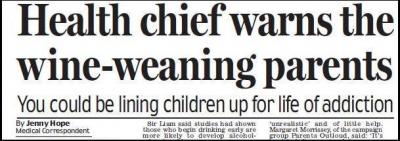Turning water into whine
Middle-class parents have been taken to task by the Chief Medical Officer, Sir Liam Donaldson, over what he calls their “obsession” with serving watered-down wine to their children.
Overlooking the fact that this has long been a custom in wine-drinking countries such as Italy and France, where binge-drinking is less of an issue - and that there is not much evidence that it is an obsession here - Sir Liam said that the science is clear. Letting children taste wine to ready them for adulthood was “misguided” he said. Here's how the Daily Mail reported his remarks:

What exactly is that science? Sir Liam’s remarks were made as he published final guidance on alcohol and children, a report detailing the damage done by binge drinking. Most of the guidance is unexceptionable, even obvious; but not necessarily any the worse for that.
Chapter 4, page XI, summarises what appears to be the justification for the CMO’s remarks. It says; “When parents are openly permissive towards adolescent alcohol use, young people tend to drink more. In general, when parents show disapproval, children are less likely to drink.”
This is elaborated in Section 5.4.2, which cites essentially one supporting document, an Australian report of 2004, Parenting Influences on Adolescent Alcohol Use, by Louise Hayes and colleagues. Just three paragraphs of this 102-page report touch on the issue of “parental permissiveness”.
It in turn cites a study in Psychology of Addictive Behaviors by Mark Wood of the University of Rhode Island and colleagues, also published in 2004. Dr Wood's team carried out a regression analysis of the effect of parental permissiveness on subsequent binge drinking. Parental permissiveness was measured by asking adolescent respondents how many drinks each parent would consider an upper limit during their senior year of high school, with a range between no drinks at all and seven drinks.
What this study found was that “higher levels of perceived parental involvement were associated with weaker relations between peer influences and alcohol use and problems”.
In other words, parental involvement moderates and does not increase the peer pressure to drink among adolescents. That is exactly the opposite conclusion to that drawn by Sir Liam and (to a lesser extent) by the report from which he was purportedly drawing his “clear science”.
Dr Wood is not saying that parents have no influence, or that permissive parenting does not have effects. But permissive parenting in this context means turning a blind eye and ignoring heavy adolescent drinking, not offering children watered-down wine. If there are any studies that directly address that particular behaviour, they were not included in the review that led to the guidance.
The middle-class parents castigated by Sir Liam are not "permissive" in the sense implied by the studies the report does cite. There is no evidence to justify his remarks. So much for clear science.




Anonymous (not verified) wrote,
Mon, 21/12/2009 - 11:19
What about the section in Hayes et al.'s paper on "Parental supply of alcohol" (p.35 - shortly after the section on 'parental permissiveness')? Here they cite a paper by Jackson et al. (1999) that seems a more plausible source for views like Sir Liam's. This paper seems to suggest that being allowed to drink alcohol at home during Grade 5 increases the odds of children consuming alcohol at Grade 7 (whatever exactly this means - I concede it would be no great surprise if they merely found that children allowed to drink alcohol at home in Grade 5 were still allowed to drink alcohol at home in Grade 7).
I cannot access the full text of the Jackson et al. paper, and have no idea exactly what their findings were, how well they carried out their study, or how appropriate their conclusions were. It would be helpful if Nigel Hawkes also gave an appraisal of the findings of this study.
Smurph (not verified) wrote,
Tue, 22/12/2009 - 20:13
Surely, the greatest influences on teenage alcohol consumtion are their peers and idols. Permissive parents only enable their offspring to participate fully in the social norm of the immediate enviroment. Alas, this is almost impossible to police, so lets go for the soft option and show that we are doing something, these findings cost money and we must prove cost effectiveness in these straightened times.
Wilma (not verified) wrote,
Wed, 06/01/2010 - 17:55
When parents allow their children to drink watered-down wine, this is done in a controled environment. It shows that the odd glass of wine - with a meal I expect - does not harm anybody.
I am more concerned with the introduction of alcopops for teenagers. These alcopops contain distilled, i.e. strong and liver damaging, alcohol while the drink itself tastes like a softdrink. I would rather see children drink beer or wine - i.e. more natural products, than alcopops.